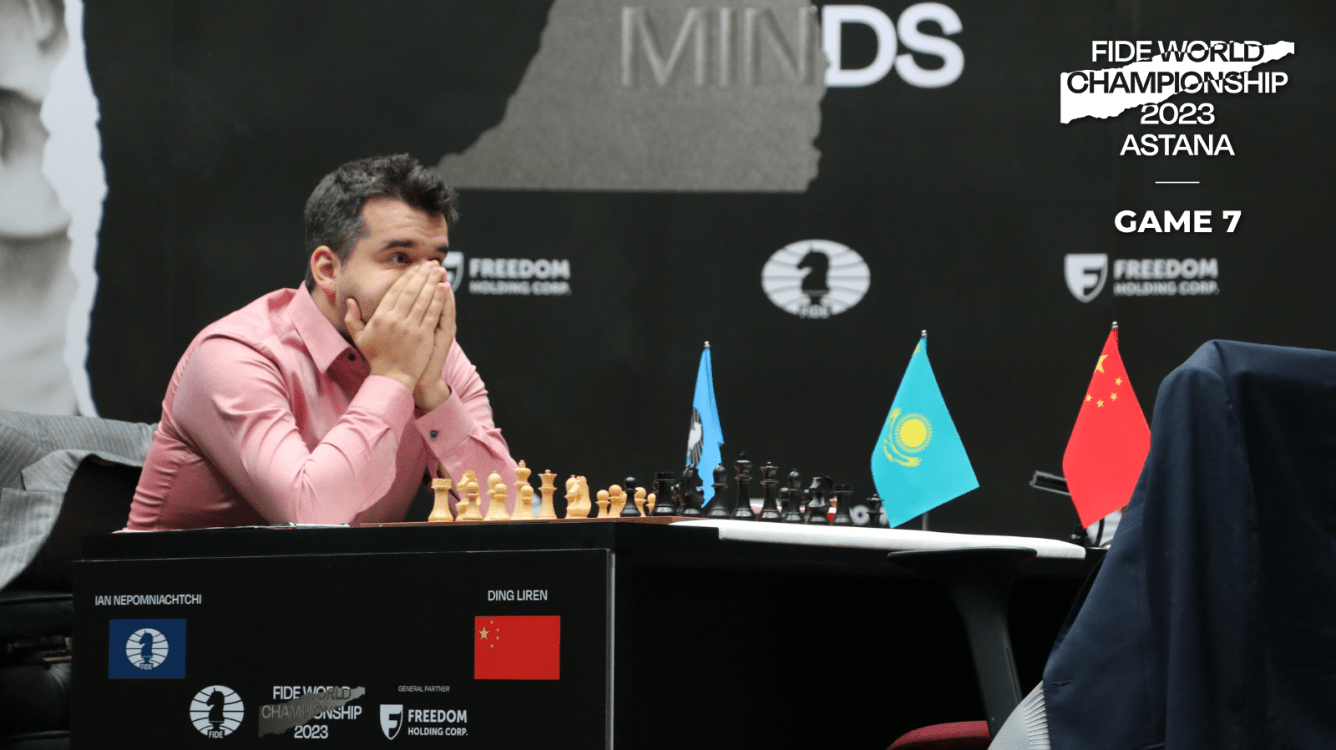
Nepomniachtchi Wins After Ding's Time Pressure Collapse, Takes Lead Again
GM Ding Liren produced the latest surprise in the seventh game of the 2023 FIDE World Championship. He opted for a French Defense to combat GM Ian Nepomniachtchi's 1.e4 but fell at the crucial moment after blundering under severe time pressure. Though Ding built a promising position, capitulation ensued after a tense encounter where all three results were possible.
With the scores now at 4-3, Ding will need to press with the white pieces in game eight on Thursday, April 20, at 15:00 Astana time (2 a.m. PT/11:00 CEST) after a much-needed rest day.
The live broadcast was hosted by GMs Anish Giri, Daniel Narodistky, and IM Tania Sachdev.
Tension has continued to brew in the match and with no two games looking remotely similar, it is clear that the players will continue to push the boundaries and innovate in order to get ahead in Astana.
Generally known for his "predictable" repertoire, as outlined by Giri, Ding has continued to stun the chess world, and in round seven, he avoided Nepomniachtchi's venomous Spanish and Italian setups by stretching out his arm and grasping the e-pawn. Expecting 1.e5, Nepomniactchi was immediately shaken to see the pawn land on e6... the French Defense.
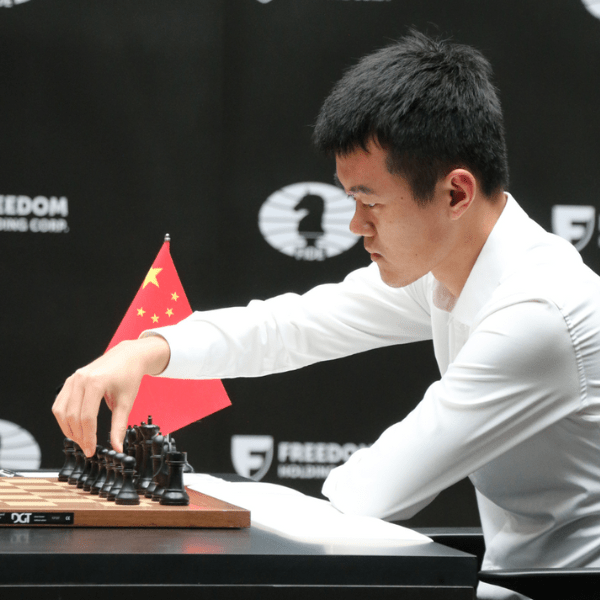
Naroditsky highlighted that "the last time the French Defense was played in a world championship match was in 1978 between GMs Anatoly Karpov and Viktor Korchnoi" and Giri was quick to suggest that it was likely GM Richard Rapport's idea for Ding to play the opening in round seven.
🚨🚨🚨 Twist on the first move: Ding Liren plays the French Defence!
— ChesscomLive (@ChesscomLive) April 18, 2023
"Wow! Unbelievable" - @GmNaroditsky
"It is huge, Oh my God!" - @anishgiri #NepoDing pic.twitter.com/uNHo10ccF8
Ding confirmed in the press conference that he half-jokingly suggested the French Defense to Rapport before the match, and his second "insisted" on this approach for game seven the day before.
Nepomniachtchi uncharacteristically spent some time playing his opening moves and selected 3.Nd2, a move that the commentators described as "timid." Giri claimed that the French was likely "a big surprise for Ding himself," and given that his opponent hadn't played the opening competitively since 2013, Nepomniachtchi likely lacked deep preparation in these lines.
The Candidates winner was the first to bare his emotions in the match and swapped out his usual confidence and fast-paced moves with a sullen demeanor and spent the opening phase with his head in his hands.
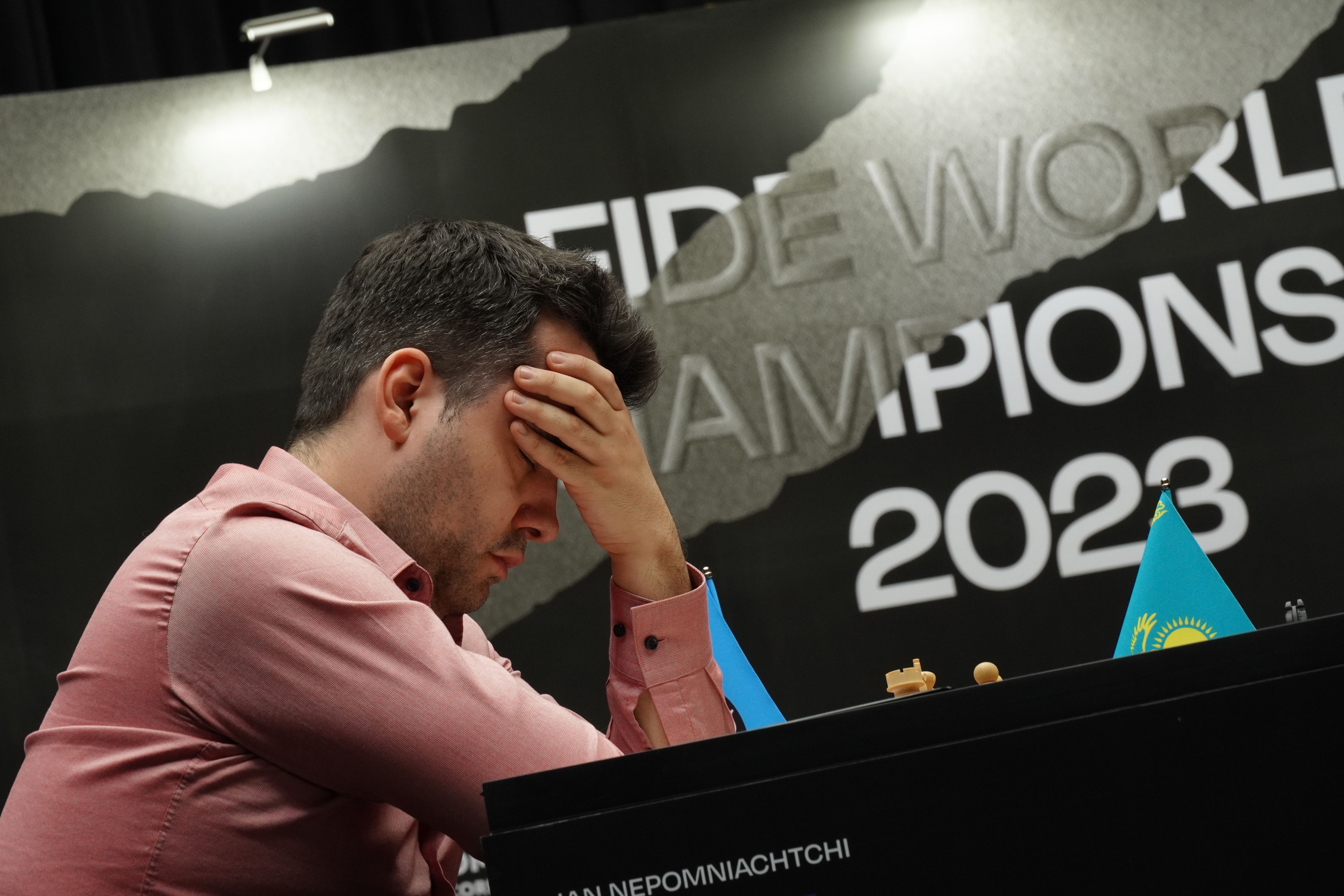
On move 12, Nepomniachtchi chose the novelty 12.Bd3, an improvement on Kruppa-Dokhoian's 1987 clash that resulted in a win for Black, but extensive time usage was a sign that he was improvising. The world number-two would later assert: "Clearly I didn't expect anything like this, a lot of punches to both sides," a comment that applies to both the individual game and the match overall.
Having survived the early tango in the center, Nepomniachtchi started to lean forward in his seat when Ding played the provocative 13.Nf6, sensing that after 14.Qh4 he would have the type of position that he has so far enjoyed in the match.
Facing several dangerous tactical ideas, Ding defended accurately with 16.Rad8!, keeping the position alive, and encouraging Nepomniachtchi to win the exchange at the cost of his initiative. Like a puzzle that Naroditsky declared was "Dvoretsky-esque" in nature, White declined the opportunity and instead decided to bring more pieces into the fray, this time offering Ding a poisoned pawn.
Quick awareness test: Can you spot why ...Qxb2 is a blunder? #NepoDing pic.twitter.com/gEf4lsfwuA
— ChesscomLive (@ChesscomLive) April 18, 2023S
Multiple lengthy thinks during this period left the world number-three in increasing time trouble, with the Chinese prospect needing to make 21 moves in just 26 minutes in order to reach the first time control! In the press conference, Ding would later state: "I just couldn't find the right continuation during the game."
Coincidentally, Ding really found his groove as his time dwindled, playing consecutive brilliant moves on turns 22 and 23 (according to Chess.com's Game Review), giving the exchange for a healthy bishop pair, reminiscent of the 1987 game that Ding denied was part of his preparation.
GM Ding Liren finds a beautiful move to maintain the balance as Black! #NepoDing
— ChesscomLive (@ChesscomLive) April 18, 2023
Game: https://t.co/v8eBe4F6kc pic.twitter.com/a23gsEPYuk
After going into the think tank and utilizing his immense time advantage, Nepomniachtchi appeared to steady the ship by trading a pair of bishops. However, Ding's dark-squared bishop continued to "dominate" the board. Nepomniachtchi would later state: "The whole game was extremely sharp and extremely tense," further admitting that "every side got what he wanted," perhaps alluding to the complications that arose when Ding started playing with clinical precision.
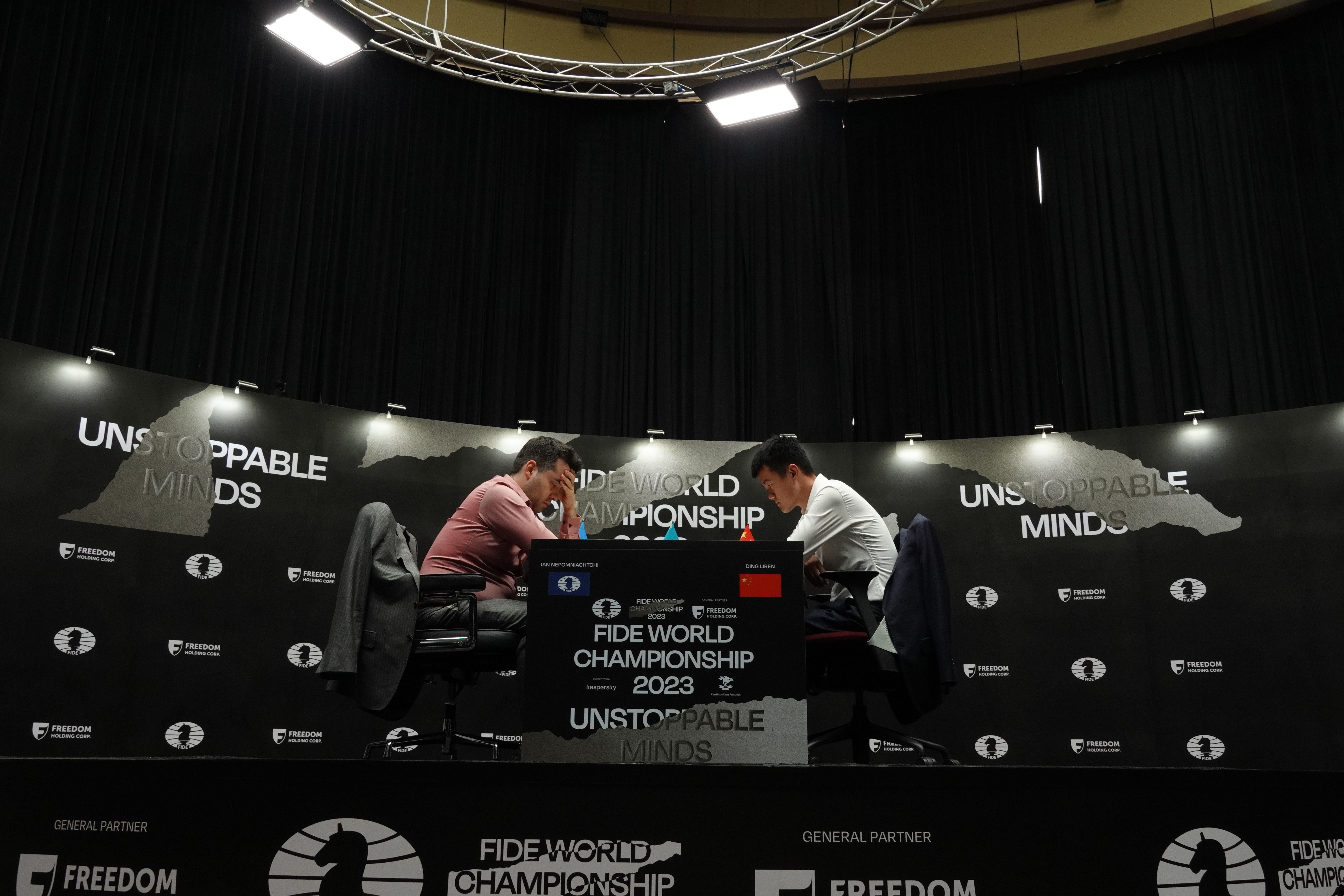
On move 32, with Black beginning to press his advantage, the inconceivable occurred. Ding, clearly feeling the heat of the moment, misevaluated his better position and exclaimed in the press conference: "If I just wait here for Rf1 then my position is hopeless," highlighting the notion that he missed the principled 32.Be5! that would have put White on the back foot.
To make matters worse, Ding spent five of his remaining five-and-a-half minutes on this move, leaving the chess world baffled and Chess.com's commentators to suggest that he had "malfunctioned." When asked about this later, an inconsolable Ding simply stated: "I played the game not so bad, but in the end, I messed up things."
With no increment to save him and just 45 seconds left on the clock, Ding blundered away the game and resigned on move 37 with three seconds on the clock, ironically three moves short of the first-time control.
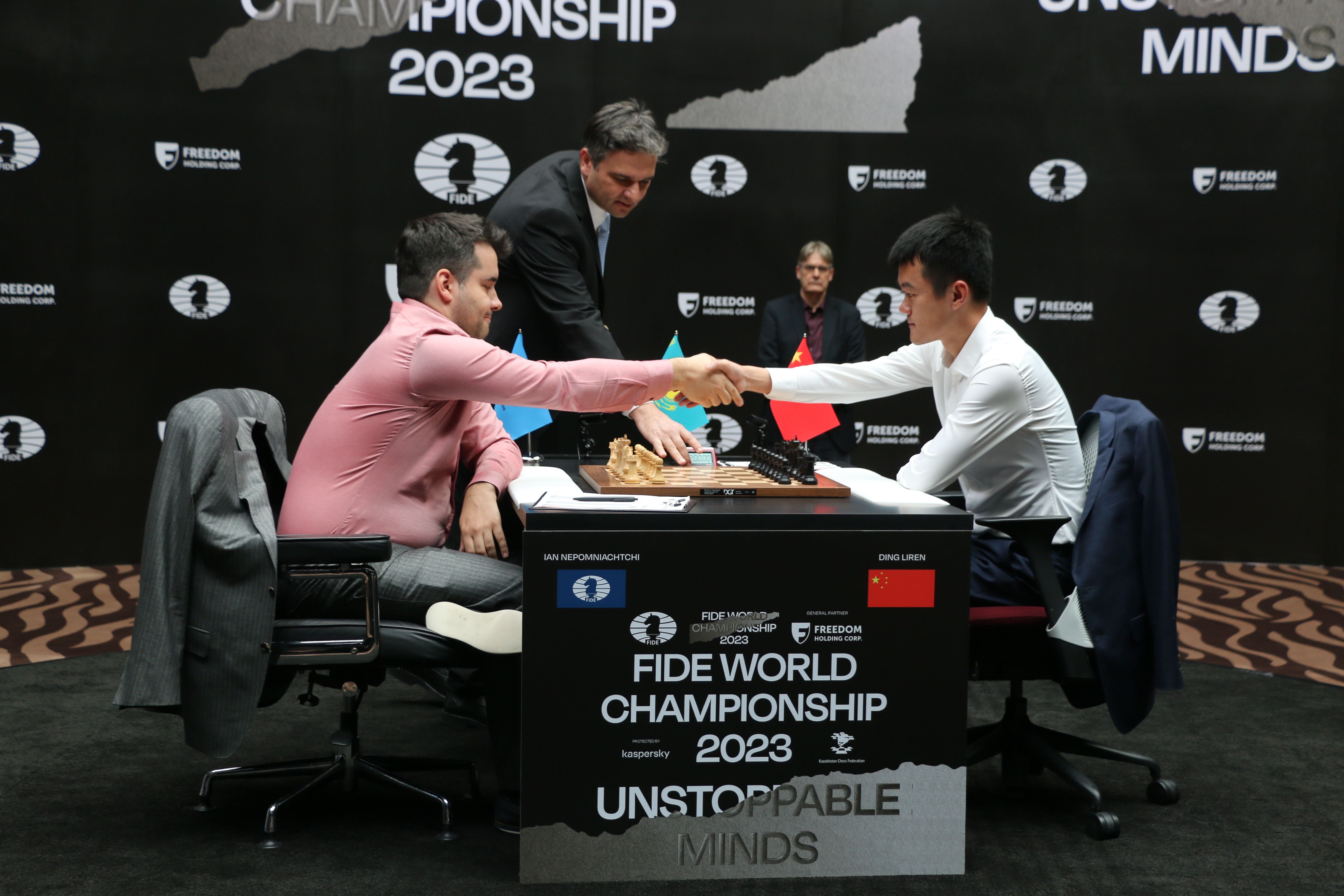
GM Rafael Leitao analyzes the tense battle below.
A heartbreaking loss and another decisive game in one of the bloodiest matches in chess history. The point might be argued that the level of defense has been poor and this is the main reason why there are so many decisive games. I agree with this argument, but that's exactly what I like to see as a spectator. Tense games where one of the players can crack under pressure. I'd rather watch this than a streak of perfect games all leading to a draw.
You can watch video recaps of the FIDE World Championship in our playlist below (click here).
While the result was devastating for Ding's campaign, he has proven that he can recover from such situations. With both players riding an emotional rollercoaster on the world's stage, it has been fascinating to witness not only the gameplay but the psychology of the match.
GM Levon Aronian was one of many gushing over the "intensity and beauty" of the world championship so far, and his comments aged well as round seven transpired.
I hope the intensity and beauty of this #chess World Championship will remind people that classical chess is quite often far more watchable and exciting than blitz or rapid chess. A chess boom combined with a lack of classical events does not make sense.
— Levon Aronian (@LevAronian) April 17, 2023
With five decisive results in seven games, we have reached a historical moment. The last time that five of the first seven world championship games were decisive was the 1958 match between GMs Mikhail Botvinnik and Vasily Smyslov (this excludes the 1972 GMs Bobby Fischer vs. Boris Spassky match, as that included a forfeit).
Asked by FM Mike Klein to compare this match to his 2021 encounter with GM Magnus Carlsen, Nepomniachtchi said: "I guess no one actually expected [so many decisive results]... perhaps people, at least for some time, will not state that classical chess is dead." He added: "I'm not sure if it's fun, but it's exciting for sure."
With this in mind, it is anyone's guess what happens next, but one thing is for sure: after a rest day leading into round eight, where Ding will play White, fireworks are expected.
Match Score
| Fed | Name | Rtg | 01 | 02 | 03 | 04 | 05 | 06 | 07 | 08 | 09 | 10 | 11 | 12 | 13 | 14 | Score |
| Ding Liren | 2788 | ½ | 0 | ½ | 1 | 0 | 1 | 0 | . | . | . | . | . | . | . | 3 | |
| Ian Nepomniachtchi | 2795 | ½ | 1 | ½ | 0 | 1 | 0 | 1 | . | . | . | . | . | . | . | 4 |
The 2023 FIDE World Championship is the most important over-the-board classical event of the year and decides who will be the next world champion. Nepomniachtchi and Ding play a match to decide who takes over Carlsen's throne after the current world champion abdicated his title. The match has a €2 million prize fund and is played over 14 classical games; the first player to gain 7.5 points wins.
Previous Coverage
-
- Ding Finds Mating Net In Game 6, Ties Match Score Again
- Nepomniachtchi Breaks Away Again, Outplays Ding In Game 5
- Confident Ding Wins Game 4, Levels Match Score
- Ding Holds Nepomniachtchi To Draw In Game 3
- Nepomniachtchi Wins Game 2 With Black After Navigating Ding's Novelty
- Nepomniachtchi Presses Big Advantage In Game 1, Ding Escapes
- All The World Chess Champions
- Meet The Challenger: Ding Liren
- 5 Most Memorable Games Between Ian Nepomniachtchi, Ding Liren
- FIDE World Championship 2023: All The Information


